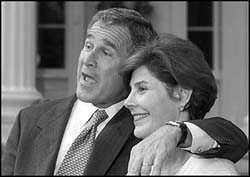|
News
|
|
|
Perspectives
|
|
|
Arts
|
|
|
Sports
|
|
|
Other
|
|

Style Battles Substance in Current Political Arena
by Jeff Little

|
|
Stylin' or Substantial? GOP presidential nominee George W. Bush and wife Laura. (photo courtesy washingtonpost.com) |
Style versus substance: it's an age-old issue which has confronted the American polity since our inception. Rarely has this dichotomy presented itself as clearly as in the recent presidential debate, and in the current presidential race period. Watching the Gore-Bush show on Tuesday night I was reminded of George Foreman and Muhammed Ali's famous 1974 "Rumble in the Jungle." In that historic fistic display, Ali countered the stronger, larger, harder punching Foreman with his rope-a-dope defense. Ali subjected himself to round after round of Foreman's punishing body-blows in an effort to tire, confuse, and ultimately defeat his challenger. Forgive me for invoking the greatness that is Muhammed Ali when describing the ineptitude and bumbling incoherency that is our current GOP Presidential candidate, though you must admit the rope-a-dope comparison is appropriate at both the figurative and literal level.
Nevertheless, Gore was Foreman stronger, smarter, more imposing, dominating in every respect but one ‹ failing to land that one knockout blow that could have once and for all shown the American public the weaknesses of G.W. Once again intellect and flamboyance went head-to-head, and for the time being remain deadlocked.
In an effort to wring one more story out of the campaign, I approached recent students from the Oberlin Initiative in Electoral Politics. For those unfamiliar with the OIEP program, here is some background. In the wake of Long Dong Silver and the "high-tech lynching" that is otherwise referred to as the Clarence Thomas confirmation hearings, two Oberlin alums, Richard and Dorothy Cole, had become disappointed by the political climate of the early '90s. To combat what they felt was a decline in the level of public service they endowed OIEP as a way for students to gain access to the political process. As a result of the Coles' endowment, every year students get an opportunity to intern in a campaign in any area of the country in any type of election. This summer I was lucky to be a part of the experience. The main topic we talked about was the issue of style over substance and, given their recent internship experience, what the OIEP thought of the current battle between the two.
Junior Noah Heller, who worked on a Congressional race in Montana, said that there is too much emphasis placed on "how much money is raised, how they pronounce their words, the conflict between candidates, and not enough articles on issues."
Senior Erika Hanson, in response to Heller, said, "this is because we are in a more advanced technological age. We're not voting on particular issues. We're not voting on policy, we're voting for a figurehead, an image that may agree on our policies. That's why the campaign is more important than policy."
Senior Aaron Leavy, fresh off a campaign for a State House seat, thinks that people "right now don't care about issues, but that's a cyclical thing. I think it's a bit ivory-tower elitist to think that if we just present them with the issues then we will have a more informed populace."
Senior Hardy Merriman, who worked on the Clinton Senate campaign, replied that there is "way too much emphasis" on style because politics is "competing with Hollywood right now." He said that the "appeal of Bush over the appeal of Gore is an appeal of style over substance, and the fact that they're neck-and-neck shows you that style and substance are viewed neck-and-neck.
But honestly, I think style may be more important than substance. Look over the last 20 or 30 years and look at Reagan: style; Clinton: style; Bush [the elder]: substance, and he's a one-termer." At a more local level, Merriman thinks that the "increased accountability" of elected officials increases the importance of a politician's performance.
Both senior Christina Hatzidakis and junior Naomi Sabel worked for political consulting firms. For Hatzidakis her job over the summer was "focused on image. We knew what the candidate's strengths were and focused on making sure that their message got through and worked on supporting that." For Sabel, who worked mainly on polling, her job was "to discern the actual issues and what was most important to the polls and focus groups. Once we had a good idea where the district lied politically, we spent a lot of time with the candidate to fine tune their message to adequately respond to their concerns." But perhaps the most hopeful statement comes from Sabel when she reminds us that, "it's easy to say that style wins over substance. But a politician's failure to deliver on their promises nullifies that advantage in the next election."
Copyright © 2000, The Oberlin Review.
Volume 129, Number 5, October 6, 2000
Contact us with your comments and suggestions.